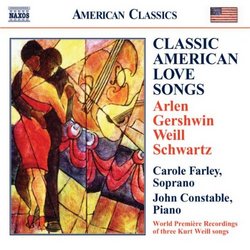Classic performances of classic songs
Robert Elgie | Ajax, Ontario Canada | 07/07/2007
(4 out of 5 stars)
"To anyone with an interest in American song, I'd say that this album is a must-buy, offering beautiful interpretations of favourites and of several rarities, too.
Each of these twenty-two songs is a pleasure to hear. There's variety in the selection in both musical and lyrical style, but what they have in common is that all are -- or should become -- classics. I can't imagine why no-one has until now recorded Weill's "The Romance Of A Lifetime". We need to be grateful to Farley and Constable for also giving us "The River is So Blue" and "The Picture On The Wall" with Weill's music and Ann Ronell's lyrics.
Who can listen to Arthur Schwartz's "You and the Night and the Music" without wanting to move to its irresistible tango? And this performance of his "Dancing in the Dark" will lift the heart and brighten any gloom.
From Harold Arlen, we get seven delights, including a lilting "I had Myself a True Love" and a bluesy "When the Sun Comes Out". Farley and Constable's thoughtful readings of several other Arlen gems take us to the centres of these reflective pieces.
There are great interpretations out there of the Gershwins' "Isn't It a Pity?", but surely not many that combine the lift of George's music and the wit of Ira's lyrics into something so light that it floats away.
This happens through the collaboration of two great artists who have the musical insight to recognize classics when they discover them (as with the Weill rarities) and in their interpretations to find for us the essential character of each song. For comparison I listened to early recordings of some of these pieces, for example of Arlen singing his own work, and found them pleasant, clever, diverting perhaps, but ultimately ephemeral. Farley and Constable turn them into art. Farley knows how to shape a vocal phrase to open up the emotion in the words she's singing. Constable has a well-established reputation as a concert accompanist; his insightful playing provides the rock-solid foundation on which Farley's performance rests. He thoroughly understands this idiom, giving sensitive and subtle readings, but is also quite capable of dazzling us with the break in Arlen's "Fun to be Fooled".
The voice Carole Farley has chosen is the only drawback to this album. I'm guessing that she correctly felt that an operatic voice would not suit this material and so altered her breath support to produce a smaller sound. Sadly this brings a thinness to her upper register, particularly on long vowels, that mars otherwise excellent performances. This would be a transcendent version of Gershwin's "Soon" except that Farley has to reach too hard for her high notes. I may be wrong about why the vocal quality is rough here and there, but at any rate this is not the voice we have on her recent recording of William Balcom songs, also on Naxos. This is reason to withhold a fifth star, but no reason not to buy a disc that has so much to offer.
In sum, this album provides sixty-six minutes of delight. The CD includes lyrics and notes on each song.
Addendum: Since I wrote this review, I've heard this disk played through a high-end stereo system. The CD player in this system provides in general more dimension at the very top end of the frequency range. Here, it is much kinder to Carole Farley's voice, which no longer sounds thin and harsh on long vowels. So, the problem may lie with the engineering more than with the artist. However, as most of us will hear this disk on more modest equipment, I'll let my earlier comments stand as an indication of what many listeners may experience."


 Track Listings (22) - Disc #1
Track Listings (22) - Disc #1